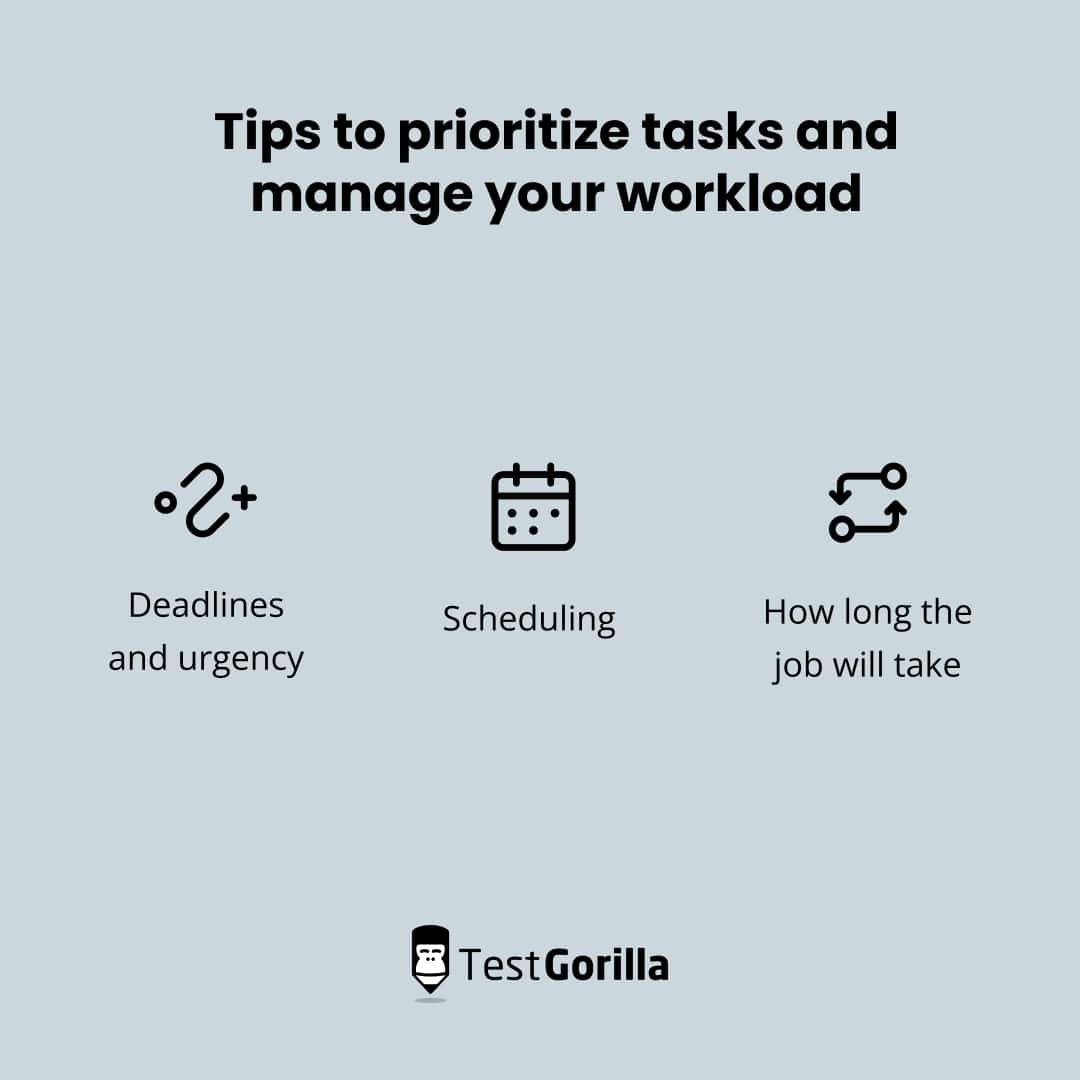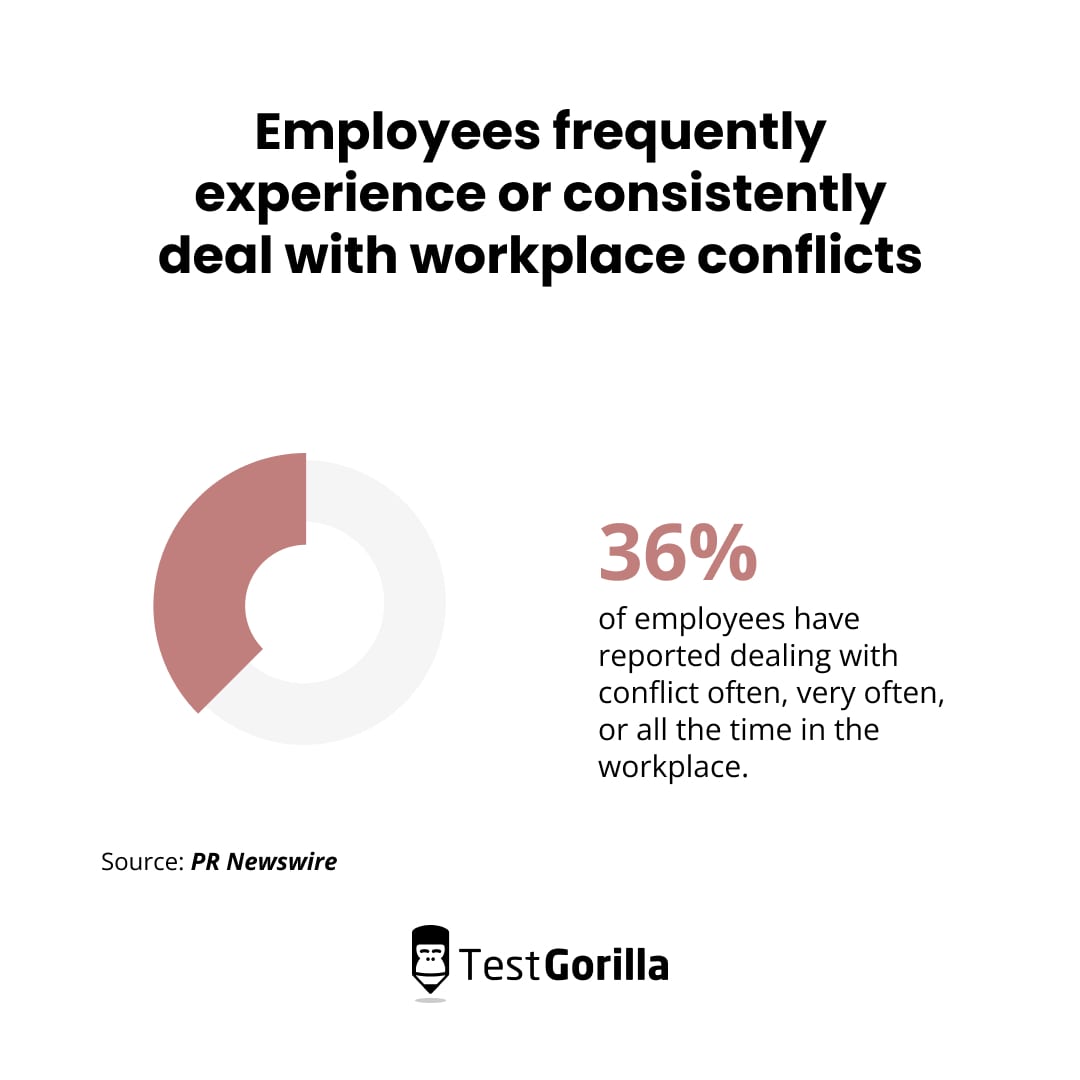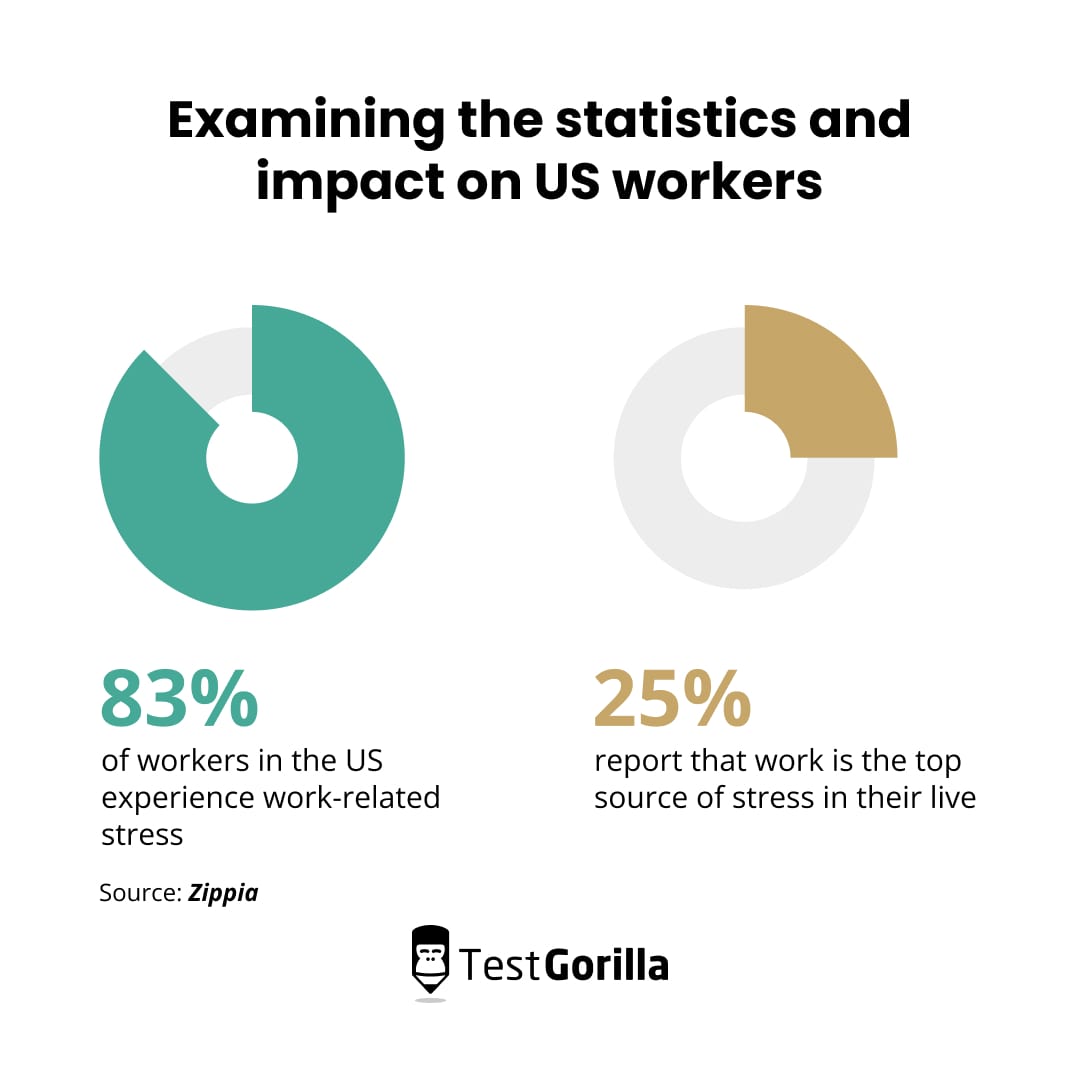Many hiring managers need help determining which candidates are the most competent and best equipped to meet the demands of the open role. The interview process is an opportunity to gauge your candidate’s proficiency and see how well they think on their feet.
Having plenty of the right questions prepared will ensure you use the interview slot to its full potential. But what are the best questions to sniff out applicants’ competency levels?
Giving candidates skills assessment tests will help you to create a shortlist of talent to invite to interview. Then you can ask some of the 30 competency-based interview questions below while interviewing.
Table of contents
- 10 warmup competency interview questions for your candidates
- 10 challenging competency interview questions for your candidates
- 5 personality competency interview questions for your candidates
- When should you ask competency interview questions in the hiring process?
- Gather your list of competency questions and improve your hiring process
10 warmup competency interview questions for your candidates
If you immediately jump to some hardball questions with your candidates, you might make them nervous by catching them off guard. Because you want to get the best out of each interviewee, you should begin with some easy qH3uestions. Here are some openers you can use to test your candidates’ competency.
1. What are your career goals? What drew you to this position?
If you’re looking for a suitable candidate for your role, you need to know they have career goals and ambitions. After all, an employee without any ambition or desire to succeed will simply do the bare minimum.
Motivated and ambitious employees, on the other hand, will be more likely to go the extra mile and dedicate more energy toward furthering their career goals.
When asking this question, you should also ensure that your candidate’s career goals align with the open position. If the candidate wants to be in marketing and you’re hiring for a store manager position, it’s safe to say that your candidate might not be with you for long.
2. How well do you work as part of a team?
You need to know that your candidate has experience working with others. They should be comfortable in a busy working environment and take a collaborative and communicative approach to teamwork.
Building a strong company culture involves hiring sociable employees who work effectively with others. However, if you are hiring for a remote position in which employees will hardly need to socialize, this question might not be as important.
3. Describe your strengths in five words.
Self-awareness and the ability to evaluate one’s own strengths are vital. A competent candidate will have an excellent understanding of their capabilities and the ability to talk about their positive attributes – without bragging. A sensible and insightful answer to this question can reveal your candidate’s most valuable abilities.
4. Describe your weaknesses in five words.
Although it’s essential for your candidate to positively affirm their strengths, they must also have a positive and honest outlook on their weaknesses. The most suitable candidates for the position will be able to state five of their weaknesses relating to the job position.
They should also provide clear, actionable strategies for mitigating these weaknesses. This way, you’ll know that your candidate can accurately self-assess and find solutions to their vulnerabilities and weaknesses. It is crucial that your employees embrace professional development.
5. What do you know about this company?
If the candidate sitting in front of you shows no interest in your organization or the work you do, why did they apply for the job in the first place?
Just as you have taken the time to assess the applicant and schedule an interview, your candidate should have taken the time to research your business.
Therefore, expect them to have at least a basic understanding of what you do. They should know your company’s mission statement and any of its noteworthy achievements.
6. What experience can you bring to this role from your career so far?
This is an excellent question to ask your candidate to ensure they understand the job description for the role you’re offering. The skills and experience they gained from their previous roles should align with the job description. The more relevant their answers, the more likely your candidate is competent enough to take on the role.
7. Describe a situation in which you had to think on your feet.
There is more to this question than might appear. It requires your candidate to think quickly during the interview and provide you with a coherent and interesting response. They should be able to describe an example of a time they had to think rapidly.
An interesting and relevant answer reveals that the candidate is a fast thinker who may be able to come up with ideas and solutions without delay. It shows that they have excellent verbal and conversational skills that would be great for a customer- or client-facing position in which quick communication is essential.
8. Describe your leadership experience.
Even if you’re hiring for a low-level position, you still need to understand the importance of leadership skills. Asking this question to every candidate ensures that your employees have the potential for progression and possibly even the ability to step up to a leadership position later in their careers.
Those who provide a clear example of a time when they had to lead others toward a specific output or goal have a high level of competency and potential.
9. How do you keep your professional knowledge up to date?
A competent candidate will know that nothing is constant in the professional sphere. New tools, technologies, and discoveries are constantly changing our approach to how we work. The value of skills is estimated to depreciate by half every four years.
As a hiring manager or recruitment agent, you should ask your candidate how they keep themselves up to date on the latest developments in their profession.
Top applicants will provide an example of a recent development in the field that they learned about on their own. They may also tell you about a course or training program they entered to gain more relevant and up-to-date skills.
This question is particularly important for scientific, medical, and technical roles.
10. Where do you see yourself in the next few years?
As we discussed earlier, ambition is one of the core indicators of a competent employee. This question is one of the best ways to see how ambitious your candidate is and whether their ambitions align with the open role.
For instance, some candidates may wish to work upward in the same organization, whereas others might prefer to move to a higher position at a different business within a few years. However, the ideal candidate will recognize the importance of working upward with the same company, which benefits both the business and the candidate’s productivity.
10 challenging competency interview questions for your candidates
Once you’ve asked your candidate some easier questions, you can begin giving them more challenging ones. The questions listed below will help you assess your candidate’s confidence under pressure, communication skills, and ability to provide structured and clear responses.
11. What skills and ideas will you bring to this company?
Your ideal candidate will bring in fresh ideas to stimulate positive change in your business. Applicants’ answers to this question will not only help you discover any hidden benefits of hiring them but also reflect their confidence level and how much they have been thinking about the role itself.
Many abilities can contribute to a new employee’s success, from soft to technical skills. Consider using our role-specific tests if you’re looking for a reliable assessment method before making a hire.
12. Provide an example of one of your most successful ideas.
If the role you’re hiring for requires innovation and creativity, you need a candidate with proven experience providing successful ideas. They should be able to give a specific example of an idea they produced, along with the results it brought about. This example could be from either a hobby or their professional life.
13. How would you boost morale and improve job satisfaction as a leader?
A competent candidate for a leadership or HR role will be able to handle people well and boost morale within the workplace. Candidates with knowledge of job satisfaction factors will provide a structured response to this question that includes a list of actionable plans for boosting employee morale. They might provide explain that they:
Provide incentive schemes (free perks, days off, working from home)
Offer praise
Create a culture of healthy competition with rewards for high performers
14. How would you support a struggling coworker or team member?
Empathy and compassion play a crucial part in competency. Your candidate should be able to engage and empathize with others to support their coworkers or team. Whether you’re hiring for a managerial or senior position, your employees must be capable of helping one another.
Look for answers that indicate candidates would offer sympathy for their coworker and provide a few suggestions for strategies to help them overcome their difficulties.
15. What was the last significant decision you made at work?
Many employees must be competent at confidently making decisions under pressure. Your candidate should be able to provide an example of their decision-making experience, including the reasons behind their decision.
If their reasoning is sound, they likely have advanced critical-thinking abilities. You can use some of our strategic interview questions to pursue this line of questioning further.
16. How do you prioritize tasks and manage your workload?
Most roles require employees to manage their workload and prioritize tasks effectively. Here are some factors that should weigh into your candidate’s workload management processes:
Deadlines and urgency
How long the job will take
Scheduling
They should be able to weigh all the factors that affect their workload and make good decisions regarding their schedule and priorities.
17. When was the last time you had to deal with a difficult person?
More than 36% of employees have reported dealing with conflict often, very often, or all the time in the workplace.
That’s why you need to know that your candidate can handle conflict well without feeling stressed. This question is fundamental, and your candidate should display a rational and strategy-focused approach to conflict.
Employees must deal with difficult people regularly in the professional sphere while maintaining relationships and taking a professional approach to the situation. No matter how skilled a candidate is, they can’t competently fill a role without having conflict resolution skills.
18. Provide an example of when you had to teach something to another person.
Being able to explain processes and educate others is an indispensable skill for most positions – not just senior leadership roles. A competent candidate will be able to communicate clearly and provide clear instructions to others. After all, most employees ask their coworkers for help before going to their superiors.
19. How do you approach conflicting ideas?
There may come a time when your employee has an idea that clashes with another employee’s plan. Some ways they may resolve this include the following:
Combining ideas
Discussing and comparing the ideas
Voting on the ideas
Whatever your candidate’s answer to this question is, their approach should be diplomatic. You cannot consider your candidate competent if they can’t deal with conflict constructively.
20. List five indicators that a work environment requires some changes.
This question is particularly important if you’re hiring for a leadership or innovation role. However, employees of all levels should be consistently contributing to improvement in the workplace by providing suggestions for improvement.
Asking this question will let you know whether your candidate likes to think about the bigger picture and identify areas for improvement or whether they prefer to focus on the task at hand.
5 personality competency interview questions for your candidates
You need to know how your candidate’s personality aligns with the job description. One of the best ways to gather intel on your candidates’ personalities is to use a TestGorilla personality and culture test – consider implementing tests alongside the interview process for a more in-depth understanding.
Here are some closing interview questions that can help you understand how your candidate may behave and interact with others when working in the position.
21. Are you an introvert or an extrovert?
Asking your candidate whether they’re introverted or extroverted is a great way to get to know them better and understand their aptitude for the role. If you’re hiring for a remote and task-focused position, an introverted candidate may be an excellent fit for the role.
However, if you’re hiring for a more social and customer- or client-facing role, then you may prefer to opt for an extroverted candidate. To assess candidates’ answers, consider how their traits align with your organization’s values or whether candidates can adapt to your company’s environment.
22. Describe yourself in five words.
Learning about your candidate’s personality and character traits can enable you to get to know them on a deeper level. This question also helps you understand your candidate’s self-awareness, confidence, and social skills.
A fun and lighthearted response to this question could indicate that the applicant has a chatty and vibrant personality, which could be ideal for leadership and socially oriented roles.
23. How do you work best?
Each person has their own style and approach to working. Your candidate’s working style should align with the working environment within your business. For instance, if your candidate works well in high-pressure environments and finds stress or time constraints motivating, this could work in your favor.
Or perhaps they like to take an independent approach to managing their workload. Such an independent employee could also be an asset for your managerial staff by helping reduce their burden.
23. What’s your method for handling stress?
Statistics show that 83% of workers in the US experience work-related stress, and 25% report that work is the top source of stress in their lives.
Suppose you know that your workplace can be stressful and that many employees cannot handle the stress upon joining your team. In that case, you need a competent candidate who can cope with these conditions.
The ideal applicant will be able to provide numerous examples of how they handle stress, including their methods for preventing burnout, focusing on the task at hand, and avoiding procrastination.
25. What’s your ideal working environment?
An open-ended question like this is great for determining whether your candidate is a good fit. Their answer should align with the working conditions of the position you’re hiring for.
Since candidates won’t know much about your working environment, you should get honest answers. This will reveal which candidates will potentially be happiest in your working environment.
When should you ask competency interview questions in the hiring process?
When you’re hiring, you should ask competency-based interview questions after giving candidates skills tests. You’ll also need to ask questions that ensure your candidate has the relevant skills and experience for your opening.
Competency questions come in handy when you need to confirm that your candidate has fundamental skills like leadership, workload management, and conflict resolution.
To begin selecting candidates for interviews, give them competency skills tests and other skills tests specific to the role. This will help you narrow down your list of candidates to those who scored the highest.
From there, you can begin interviewing your candidates. Remember to include competency questions to ensure your candidate not only has the necessary experience and knowledge for the job but also understands the core concepts of leadership, teamwork, and critical thinking.
Gather your list of competency questions and improve your hiring process
If you’re hiring for an open position, you need to know that your candidate thoroughly understands what’s needed to succeed in a professional environment. Compile a list from the competency questions provided in this article to prepare for your next interview.
If you need extra help refining your hiring process, why not take advantage of a free 30-minute demo with our team?
We can review your processes and help you identify key areas for improvement. TestGorilla also offers a wide range of aptitude tests in our test library to help you narrow down your candidate pool and create a more efficient selection process.
Related posts
Hire the best candidates with TestGorilla
Create pre-employment assessments in minutes to screen candidates, save time, and hire the best talent.
Latest posts
The best advice in pre-employment testing, in your inbox.
No spam. Unsubscribe at any time.

Hire the best. No bias. No stress.
Our screening tests identify the best candidates and make your hiring decisions faster, easier, and bias-free.
Free resources
This checklist covers key features you should look for when choosing a skills testing platform
This resource will help you develop an onboarding checklist for new hires.
How to assess your candidates' attention to detail.
Learn how to get human resources certified through HRCI or SHRM.
Learn how you can improve the level of talent at your company.
Learn how CapitalT reduced hiring bias with online skills assessments.
Learn how to make the resume process more efficient and more effective.
Improve your hiring strategy with these 7 critical recruitment metrics.
Learn how Sukhi decreased time spent reviewing resumes by 83%!
Hire more efficiently with these hacks that 99% of recruiters aren't using.
Make a business case for diversity and inclusion initiatives with this data.






















